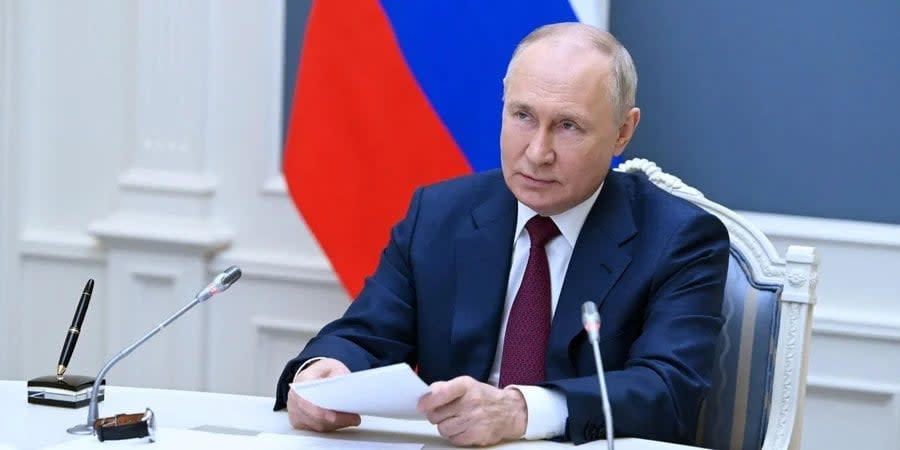Where does Putin's strange self-confidence come from

- Oops!Something went wrong.Please try again later.
One of Putin's constant traits that catches the eye during his public speeches is his self-confidence.
Read also: Two-thirds of African leaders refuse to attend Putin’s summit
If you listen to the Russian leader, the war is going according to plan, and he is ready to continue it until all the goals are achieved. At the same time, he remembers to signal to Ukraine's Western allies that they should not go too far, as a brutal response will not be long in coming.
It is no secret that many people believe Putin. That's why he retains support within Russia and among his allies and why Western leaders are trying to avoid escalation.
But where does this strange self-confidence of Putin come from? It is evident that his plan has failed, and the numerous failures of the Russian army have shown the world the weakness of modern Russia. Yet, despite this, he continues demonstrating that he is in control and that his words must be taken seriously.
I believe that the source of this confidence is a sophisticated and rather complex form of self-deception that Putin uses to appear convincing to his countrymen and skillfully mislead his enemies.
Deception is typical behavior for many animals, including humans. It allows us to obtain many valuable resources, so humans have constantly improved their ability to lie throughout evolution. At the same time, we have also improved in the art of detecting lies, so we can tell when someone is bluffing, even by subtle changes in voice or behavior.
So how do liars emerge victorious from this mad race, deceiving in a way that doesn't reveal themselves? According to evolutionary biologist Robert Travers, we have found a way, and it's called self-deception. By believing our own lies, we show no signs of deception and appear convincing because we believe what we are saying. We have learned to deceive ourselves to better deceive others, writes Trivers, and it is hard to disagree with him.
Read also: Russians step up intimidation tactics at Zaporizhzhya NPP, including beatings, theft, blackmail
There are different ways to achieve this self-deception. One of them is to avoid unwanted information. We all do this sometimes, for example, avoiding signals that we are sick or reports that indicate our company is not doing well. This tactic allows us to disregard unpleasant realities and believe what we want to believe for a while. This is the way Putin seems to be using it.
Read also: Putin raising stakes with grain blackmail
When more convincing evidence emerged that a system had formed around him that constantly misinformed him, painting an overly rosy picture of events, many did not believe it. Putin is not an idiot, they said, and he would undoubtedly suspect that he was being lied to. This is true, but only if he wanted to. But the truth that his country was weak and sick was never to his liking. Preoccupied with dreams of Russia's greatness and his own role in history, he avoided the unpleasant truth about the actual state of affairs in the country.
His entourage responded to the wishes of their ruler and therefore sent him information that confirmed his rosy picture of the world and avoided unpleasant news. He was pretty happy with this. Of course, some part of his mind was always aware of the unpleasant truth, but he stubbornly closed himself off from it, like a seriously ill person who ignores information about his condition.
Putin believes what he says, which gives him confidence and allows him to deceive others.
Thus, Russians and partners continue to support him, while the West tries to avoid over-escalation and does not take actions that they believe could provoke Putin.
Now let's look at the situation through the eyes of Western leaders. Of course, they cannot know for sure whether Putin is bluffing or not, outlining his red lines and demonstrating his readiness to react harshly if they are crossed. How can one know the true intentions of a man who hides them even from himself?
One of the ways to expose the opponent's bluff is to take gradual offensive actions, when we take small steps to do what he warns us against and watch his reaction. In the case of Putin, this tactic involves constantly crossing the red lines he draws and watching what he does in response. Many Western leaders, who are experienced politicians and well-versed in such games, are moving along this path, albeit slowly.
Read also: Russia deploys naval mines on approaches to Ukraine’s Black Sea ports – UK
Ukrainians are trying to drive this process and are not hesitating to cross all the red lines they can reach. Their desperation is understandable, as is the caution of Western leaders - they have a lot to lose, and Russian missiles do not force them to wake up every morning thinking about how many of their citizens died that night.
Read also: ‘Paralyzed’ Putin did nothing despite knowing of Wagner rebellion in advance – Washington Post
Nevertheless, the game goes on: the dictator who wants to hit the jackpot continues his bluff, and those who oppose him try to recognize the limits of his lies. It is not clear when the game will end, but it is clear that if the West wants to win, it cannot stop and must continue to cross the Kremlin's bloody lines.
We’re bringing the voice of Ukraine to the world. Support us with a one-time donation, or become a Patron!
Read the original article on The New Voice of Ukraine

